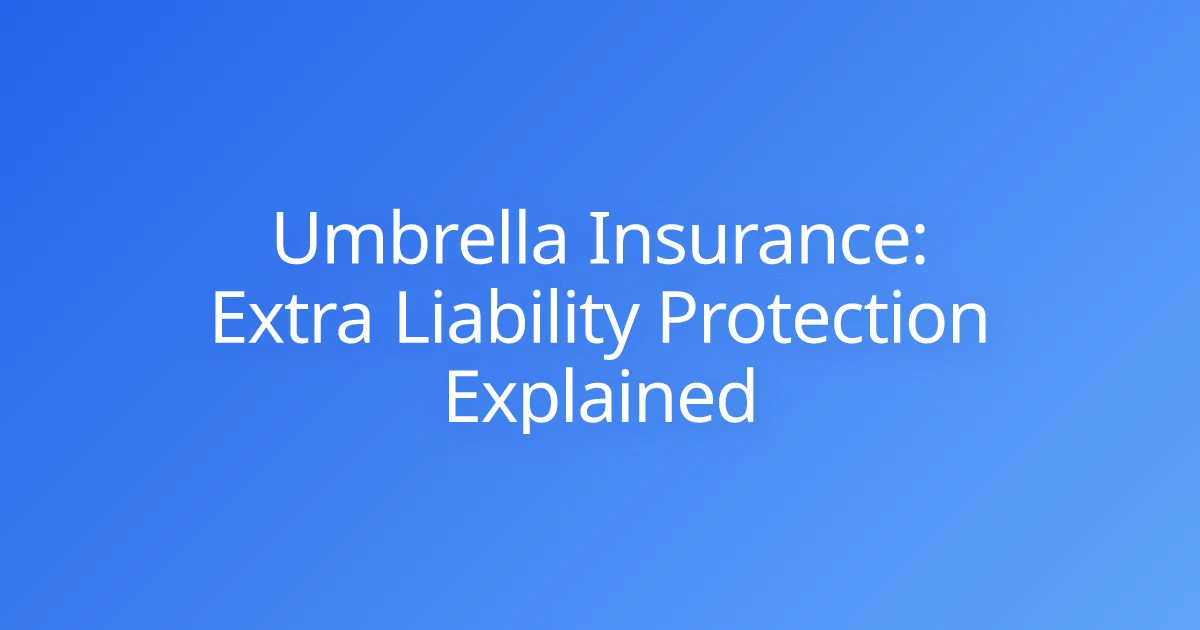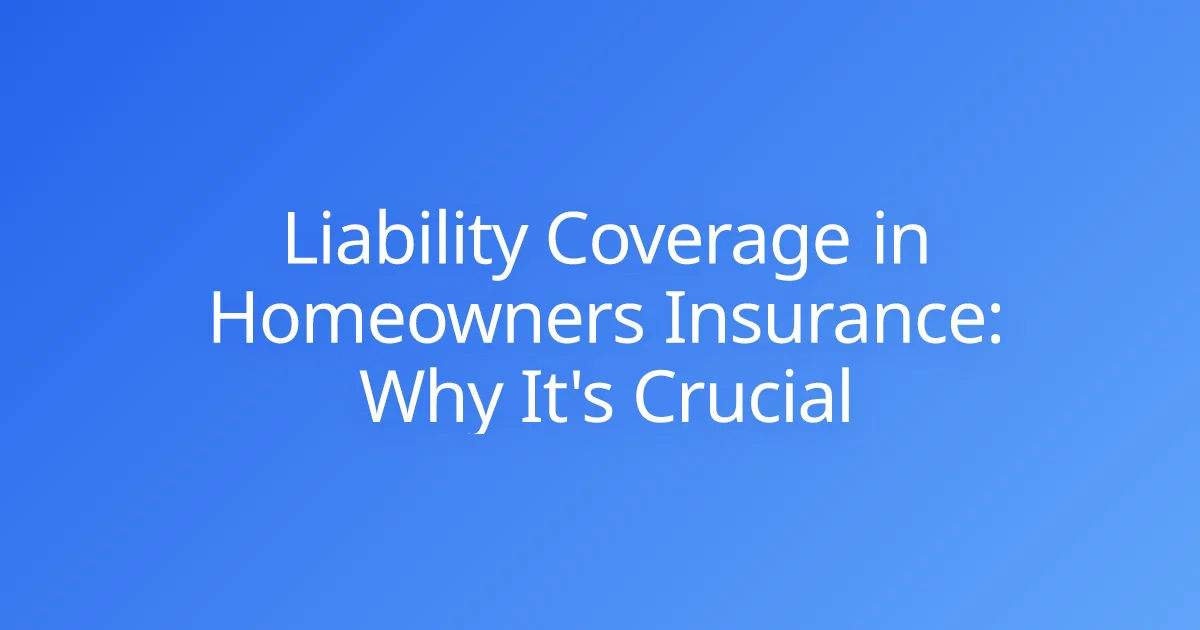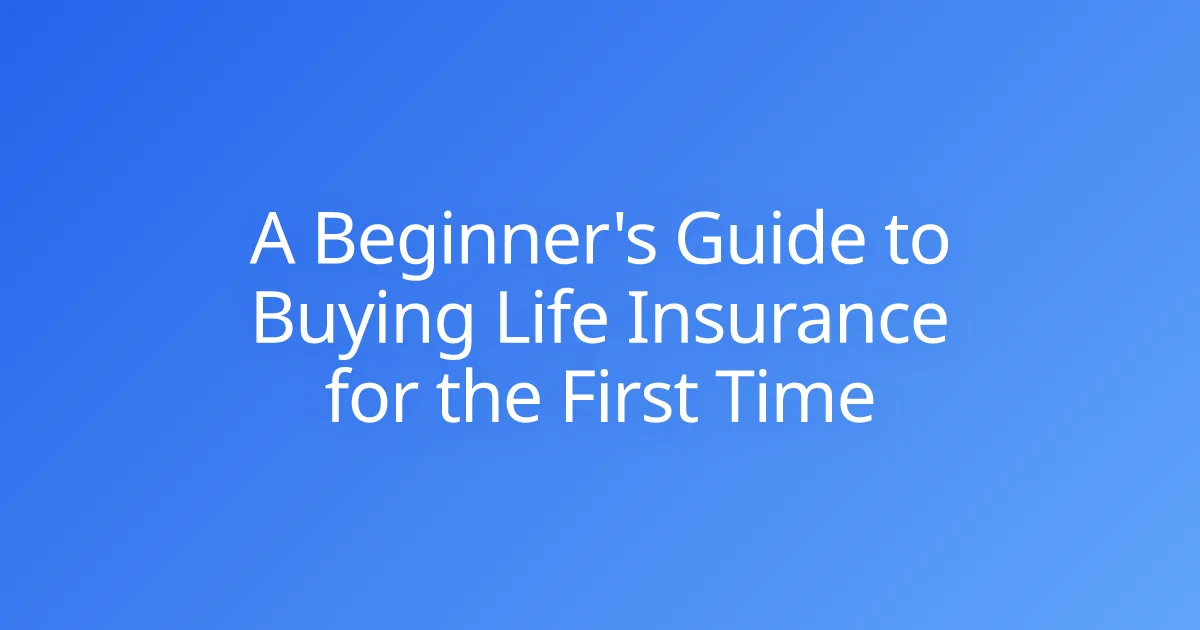Umbrella Insurance: Extra Liability Protection Explained
Imagine a scenario where a seemingly minor accident leads to a catastrophic lawsuit, with damages far exceeding the liability limits of your existing home or auto insurance policies. Your hard-earned savings, future earnings, and even your retirement funds could be exposed, threatening your entire financial security. Many individuals, confident in their basic coverage, often overlook the potential for a severe liability claim that could obliterate their assets. This crucial gap in protection can leave even the most financially prudent individuals vulnerable to life-altering financial judgments.
At The Policy Explainer, we are dedicated to simplifying complex financial safeguards. This comprehensive guide will illuminate the vital role of Umbrella Insurance, explaining precisely how this powerful policy provides extra liability protection and acts as an essential shield against potentially devastating lawsuits. We will demystify its mechanics, detail its coverage, and empower you to understand why this layer of financial security is no longer just for the wealthy, but a wise investment for anyone seeking robust asset protection.
What is Umbrella Insurance? Your High-Limit Safety Net
Umbrella Insurance is a type of personal liability insurance that provides an additional layer of coverage above the limits of your primary insurance policies, such as your homeowners, auto, and sometimes even boat or renters insurance. It's called "umbrella" because it literally sits "over" these existing policies, providing extra financial protection against large, catastrophic liability claims.
Its core purpose is to protect your assets (savings, investments, future earnings) from lawsuits that exceed the liability limits of your underlying policies. Without it, you would be personally responsible for any judgments or settlements that go beyond what your standard insurance pays.
How Does Umbrella Insurance Work? A Layered Approach
Think of your insurance coverage as layers:
- Primary Layer: Your underlying policies (homeowners, auto) pay up to their liability limits.
- Umbrella Layer: If a claim exhausts the limits of your primary policy, your Umbrella Insurance kicks in, providing an additional layer of coverage, typically ranging from $1 million to $5 million or more.
Crucially, Umbrella Insurance is not standalone; it requires you to have underlying primary policies with certain minimum liability limits. This is because it acts as excess coverage, not first-dollar coverage.
Key Coverages: What Does Umbrella Insurance Protect You From?
Umbrella Insurance offers broad extra liability protection against a wide range of personal injury and property damage claims, often covering scenarios that might be excluded or limited by your basic policies.
1. Enhanced Bodily Injury Liability
This is the most common and often financially devastating type of claim.
- What it Covers: Medical bills, lost wages, pain and suffering, and legal defense costs if you or a member of your household are found legally responsible for causing injury to another person.
- Examples:
- Catastrophic Car Accident: You are at fault in a multi-car pileup, and the injuries to others exceed your auto insurance's $500,000 liability limit. Your Umbrella Insurance would cover the excess, up to its $1 million+ limit.
- Serious Injury on Your Property: A guest slips by your pool, sustains a severe head injury, and requires long-term medical care, suing you for $1 million. If your homeowners liability is $300,000, your umbrella would cover the remaining $700,000.
- Why it's Essential: Protects you from devastating lawsuits where the damages are far higher than typical policy limits.
2. Enhanced Property Damage Liability
- What it Covers: Damage you or a household member cause to someone else's property that exceeds your underlying policy limits.
- Example: You cause a severe accident that totals a luxury vehicle and significantly damages a commercial building, with total damages exceeding your auto policy's limit. Your Umbrella Insurance would cover the overage.
- Why it's Essential: While less common than bodily injury, property damage can still be very expensive, especially if commercial property or high-value items are involved.
3. Broader Personal Injury Coverage
Umbrella Insurance often extends beyond physical injury to cover specific types of personal injury claims that your standard policies might exclude or limit.
- What it Covers: Legal defense costs and damages for claims such as:
- Slander or Libel: False statements that harm another person's reputation (e.g., posted online).
- False Arrest, Detention, or Imprisonment: Unwarranted actions leading to someone being held against their will.
- Malicious Prosecution: Unjustified legal proceedings against someone.
- Wrongful Entry or Eviction: For landlords, or if you accidentally trespass on someone's property and cause perceived harm.
- Why it's Essential: Protects against reputational and civil claims that are becoming more common in the digital age, which often are not covered by standard policies.
4. Coverage for Worldwide Incidents
Many Umbrella Insurance policies offer worldwide coverage, extending your liability protection beyond your domestic borders.
- What it Covers: Liability claims arising from incidents that occur while you are traveling internationally, beyond what your underlying policies might cover.
- Why it's Essential: Provides invaluable peace of mind for avid international travelers who face unique liability exposures abroad.
Scenarios Where Umbrella Insurance is Crucial
To truly grasp the value of Umbrella Insurance, consider these real-world examples:
- Teen Driver Accident: Your teenage child, a newly licensed driver, causes a multi-vehicle accident with severe injuries. The total medical bills and lost wages for the injured parties amount to $2 million, far exceeding your auto policy's $500,000 limit. Without Umbrella Insurance, you'd be personally responsible for the remaining $1.5 million, potentially forcing the sale of assets or wage garnishment.
- Party at Your Home: You host a large party, and a guest (who has had too much to drink) leaves your property and causes a serious accident. Even if you didn't serve them, social host liability laws in your state could hold you responsible, leading to a lawsuit far beyond your homeowners policy limits.
- Boating Incident: Your boat causes a serious accident on the lake, resulting in severe injuries to another boater. Your boat insurance limits are quickly exhausted. An umbrella policy would kick in.
- Volunteer Work Liability: While volunteering for a charity, you accidentally cause an injury that leads to a lawsuit, and your personal liability or the charity's insurance is insufficient.
- Dog Bite Lawsuit: Your normally friendly dog bites a delivery person who sustains serious injuries, leading to extensive medical bills and lost income. Dog bite claims can often exceed standard homeowners limits.
Who Needs Umbrella Insurance? Beyond the "Wealthy" Myth
The common misconception is that Umbrella Insurance is only for the ultra-rich. The reality is that anyone with significant assets or future earning potential should consider it.
You likely need Umbrella Insurance if any of the following apply:
- You own a home or multiple properties: Increased risk of premise liability.
- You have significant savings, investments, or retirement accounts: These are the assets you're protecting.
- You have a high net worth: Your assets become targets in a lawsuit.
- You have a high income: Future earnings can be garnished to satisfy a judgment.
- You have a swimming pool, trampoline, or aggressive dog: These are "attractive nuisances" or high-risk features that increase your liability exposure.
- You own a boat, ATV, or other recreational vehicles: These often carry higher inherent risks.
- You have a teenage driver in the household: Young drivers statistically have a higher incidence of accidents.
- You serve on a non-profit board: You might have personal liability for decisions made in that capacity.
- You frequently host parties or gatherings: Increased social host liability risk.
- You generate negative online content: This can increase your risk of libel/slander claims.
- You simply want robust peace of mind: Knowing you're protected against financial catastrophe.
The critical point is that the cost of defending against a lawsuit, even if you win, can be financially ruinous. Umbrella Insurance often covers these legal defense costs, regardless of the outcome.
How to Get Umbrella Insurance: Key Considerations
Purchasing Umbrella Insurance is typically straightforward, but there are a few important considerations.
1. Meet Underlying Policy Requirements
- Actionable Tip: Insurers require you to have certain minimum liability limits on your auto and homeowners policies (e.g., $250,000 bodily injury per person / $500,000 per accident for auto, and $300,000-$500,000 for homeowners liability). Ensure your underlying policies meet these thresholds.
2. Determine Your Coverage Amount
- Actionable Tip: Most Umbrella Insurance policies start at $1 million in coverage, with additional increments available up to $5 million or more. Consider your total net worth, your future earning potential, and the types of risks you face when determining how much coverage you need. A good rule of thumb is to purchase coverage that at least matches your total assets.
3. Consider Your Insurer
- Actionable Tip: Many insurance companies prefer to offer Umbrella Insurance only to their existing auto and homeowners policyholders. This allows them to manage the entire risk profile under one roof. While you might save on administrative fees by bundling, always compare quotes from multiple providers to ensure you're getting the best value.
4. Review Your Risks Annually
- Actionable Tip: As your life changes (new drivers, new assets, new hobbies, changes in income), your liability exposure changes. Review your Umbrella Insurance policy annually with your insurance agent to ensure your coverage remains adequate.
5. Relatively Affordable Premiums
- Actionable Tip: Compared to the millions of dollars in coverage they provide, Umbrella Insurance policies are surprisingly affordable. A $1 million policy can often cost between $150 and $300 per year, depending on your risk factors. The cost-to-benefit ratio is exceptionally high.
Conclusion
In a world where lawsuits can be both frequent and financially devastating, Umbrella Insurance offers an indispensable layer of extra liability protection that is crucial for safeguarding your financial future. It extends far beyond the limits of your standard home and auto policies, shielding your assets from catastrophic claims arising from bodily injury, property damage, and broader personal injury scenarios. By understanding how this powerful policy works and recognizing your unique liability exposures, you can make a proactive decision to invest in this surprisingly affordable yet profoundly important form of financial security. Don't let a single unforeseen event jeopardize a lifetime of hard work – ensure your financial future is truly protected. Do you have more questions about specific liability scenarios or how to best integrate Umbrella Insurance into your existing coverage portfolio?



